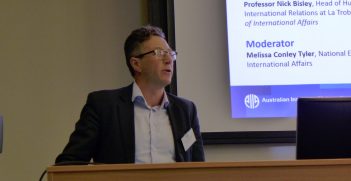Of Cricket, Sandpaper and “Shadow Values”: What Australia’s Aid Program Says About Who We Are and Our Ability to Weather the Next Foreign Policy Crisis

When it comes to Australia’s foreign aid spending, the Cameron Bancroft and Steven Smith ball tampering incident provides an illustrative analogy of the disconnect between our rhetoric and the reality of who we are and what we value as a nation.
It was over the moment the image flashed up on the replay screen at Newlands. Before that, we could still tell ourselves that our cricket team played hard but fair. But once the television cameras caught Cameron Bancroft tuck that slither of sandpaper down his pants in Cape Town, the cherished story that we had long convinced ourselves of was suddenly untenable. And with captain Steven Smith’s jarringly matter-of-fact confession at the post-stumps press conference that he had helped dream up the ball-tampering ploy, the last vestiges of a once-mighty mythology came crashing down.
As we endure another election campaign where aid policy is getting about as much attention as your average Sheffield Shield fixture, it strikes me that the Cape Town incident serves as a cautionary tale for Australia’s aid program and for our foreign policy more broadly. If our aid program were subjected to the same bright lights that Steven Smith and his vice-captain David Warner were on their return to Australia, we might find its current state tells us more about who we really are than we would like to admit.
The Newlands incident became a full-blown scandal because it was about more than cricket. It went straight to the heart of Australian national identity. The captain’s shame became our own. Then-Prime Minister Malcolm Turnbull channelled the incredulity of most Australians. “After all our cricketers are role models and cricket is synonymous with fair play. How can our team be engaged in cheating like this? It beggars belief.”
When rhetoric and reality get too far apart, something snaps. That is my take of what happened in Cape Town. It also functions as a crude short-hand for thinking through the implications of role theory for foreign policy. A given state’s national role conception – policymakers’ “perceptions of their nations’ positions in the international system” and associated behaviours – has to line up, or at least overlap to a considerable degree, with its role prescription – the expectations that other countries hold of the given state’s position and behaviour. In short, who we think we are, and what we say and do, has to line up with what others think we are, and say and do, at least to a certain degree. If it doesn’t, our credibility is eroded.
The story senior Government politicians seem to want to tell us about Australia’s aid program currently goes something like this. We Australians are generous. So is our aid program. We are a compassionate nation. Sure, we have cut our aid budget recently, but only because we need to get our economy back on track. We have to deal with the budget emergency. When it comes to aid, we can do more with less, and besides, we don’t want to spend money badly. In any case, we are spending more than ever helping our closest neighbours in the Pacific.
So how does this rhetoric measure up to reality?
Close observers of Australia’s aid program, especially those watching from abroad, would likely tell the story this way. Australia is the world’s wealthiest nation, as measured by median wealth per adult. Australians enjoy unrivalled living conditions, ranking first in the world for well-being. Australia has enjoyed more than 27 years of uninterrupted economic growth, the longest period of recession-free growth for a developed economy in history. Yet despite this, the overall aid budget has decreased by 27 percent since 2012-13, despite all other federal government spending increasing by 18 percent. These cuts put us in a race to the bottom on international rankings. Australia’s aid spending is currently at an all-time low, and budgeted to decrease even further. Rather than an expression of generosity, Australia’s aid program is increasingly framed and conceptualised through a self-interested lens. Like their colleagues in other states, our leaders appear to be “falling over each other to tell us that aid will serve the national interest.” And as for the Pacific step-up, it is a reactive rather than proactive policy, reflecting the perceived need to respond to China’s growing Pacific presence.
Clearly, there is a substantial gap between these two narratives. But why does this matter?
I’ll leave that for Dr Simon Longstaff to explain. Longstaff was engaged by Cricket Australia to undertake a review of its organisational culture in the aftermath of Cape Town. “The only thing that really matters is how close are you to the thing you want to be. The reason why that is so important is that when the gaps open up, and people look at those gaps, they perceive it as hypocrisy,” Longstaff told the Sydney Morning Herald’s Phil Lutton. “Can the organisation say what it stands for and is it willing to determine the extent to what it claims – and what it does – are in alignment.”
Whatever your views on what the appropriate levels of aid spending are, it is difficult to deny that a state’s aid-giving behaviour tells us something about its identity. This is why the misalignment in the narratives above is so problematic, especially for a self-professed top-20 country power that seeks to uphold the global rules-based order. Just as Australians intuitively understood that our cricket team’s behaviour in South Africa told us something about what the team valued, so we should accept that the way our foreign policy is conducted tells us something about what we value as a nation.
It is telling that this is a sentiment to which both of our prospective leaders wholeheartedly agree.
“Our foreign policy defines what we believe about the world and our place in it,” Scott Morrison declared in the most substantial speech on foreign policy he has delivered as Prime Minister. “It must speak of our character, our values. What we stand for. What we believe in and, if need be, what we’ll defend. This is what guides our national interest.” These sentiments were not buried deep in the speech, as ornaments for the foreign policy cognoscenti to go searching for: the speech was titled “The Beliefs That Guide Us.” Quite clearly, Morrison is saying that he believes our values must inform our interests.
Bill Shorten struck similar notes in his key foreign policy speech to date. “Our foreign policy should speak for who we are, for the confidence we have in ourselves, for the values we believe in, for the region and world in which we want to live.” Even the recent Foreign Policy White Paper concurs: “our foreign policy, must give expression to, and be formed on the basis of, the values of our community.”
At this point, I should point out that Labor enters this election with an aid policy platform that promises to begin to realign the mismatch highlighted earlier, in a way that the Coalition’s platform does not. Labor have committed to “growing Australia’s international development program” and will “reconstitute the role of Minister for Pacific Affairs and International Development.” While these changes would certainly be welcome steps, the point I want to make here is a bigger one.
I worry that, like the Australian cricket team, we haven’t quite realised that what we tell ourselves about who we are does not line up with what others infer from the conduct of our foreign policy. I worry that our aid program reflects Australia’s “shadow values” – “values and principles [that] are an expression of the unstated operating culture of an organisation” (in the words of Flagstaff’s review). And I worry that the misalignment in our words and deeds evident in our aid program represents the canary in the coal mine for our foreign policy more broadly.
President of the Australian Institute of International Affairs Allan Gyngell recently argued that Australia’s foreign policy “future is more uncertain than any we have known since the Second World War.” When you’re being challenged, and things aren’t going your way – the situation our cricket team found itself in on day three in Cape Town and the situation our leaders will undoubtedly find themselves in as they navigate an increasingly uncertain geostrategic environment – you will come undone if you are guided by only your interests, regardless of what you tell yourself and others about the values you profess. This was the ultimate lesson of the Flagstaff review and the cautionary tale sandpaper-gate provides for our foreign policy.
As Justin Langer would probably tell you, it is much better to take a dose of “elite honesty” before a crisis rather than after it. That is why it is a shame that, in the absence of an unforeseen major international event, a substantive debate about foreign policy will almost certainly not occur during this election campaign. When it does inevitability come, our next foreign policy crisis will zoom into view faster than a Mitch Johnson bouncer. Unless we do the hard work of debating who we are and who we want to be beforehand, we’ll end up flat on our backs.
Dr Benjamin Day is an associate lecturer in the Department of International Relations, Coral Bell School of Asia Pacific Affairs at the Australian National University where he teaches Foreign Policy Analysis and Australian Foreign Policy. Ben’s research explores how aid policy decisions are made. He is the co-author, with Professor Valerie M. Hudson, of the 3rd edition of Foreign Policy Analysis: Classic and Contemporary Theory (forthcoming 2019, Rowman and Littlefield). He tweets at: @benjaminsday.
This article is published under a Creative Commons License and may be republished with attribution.





